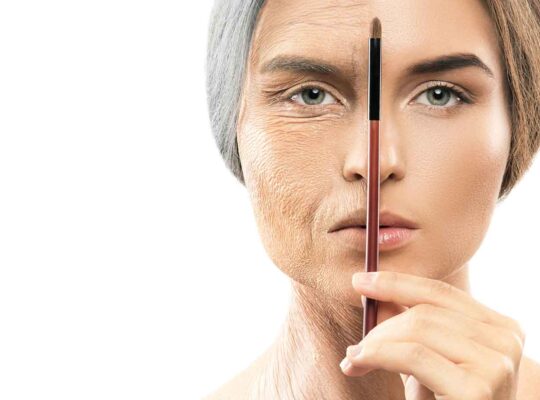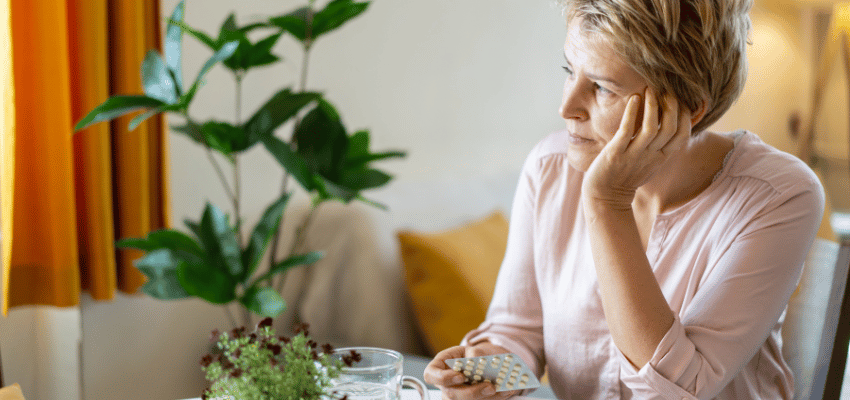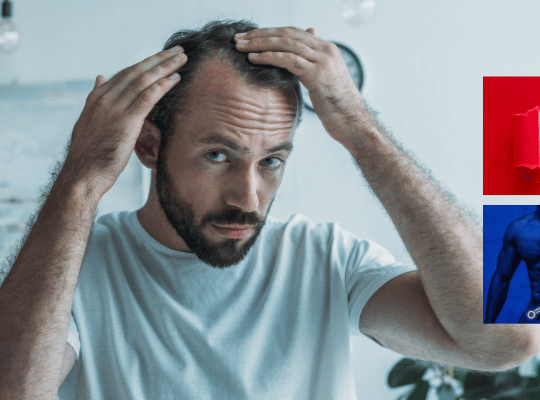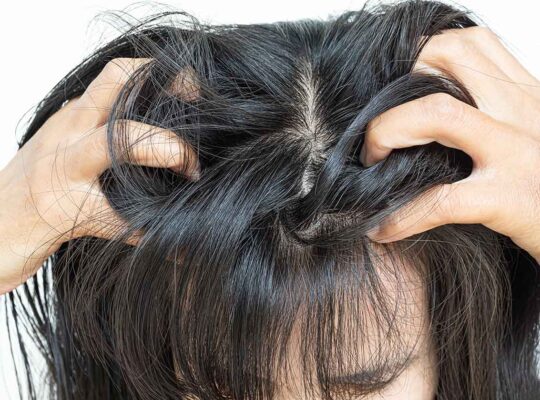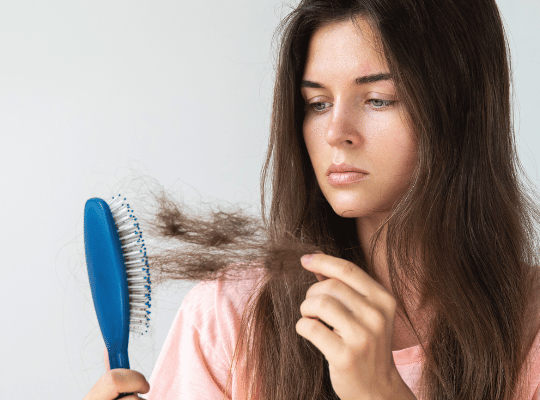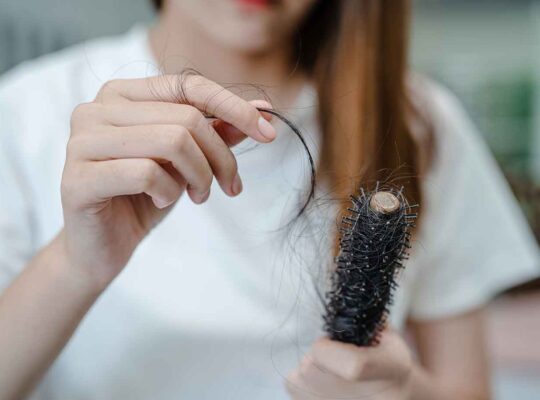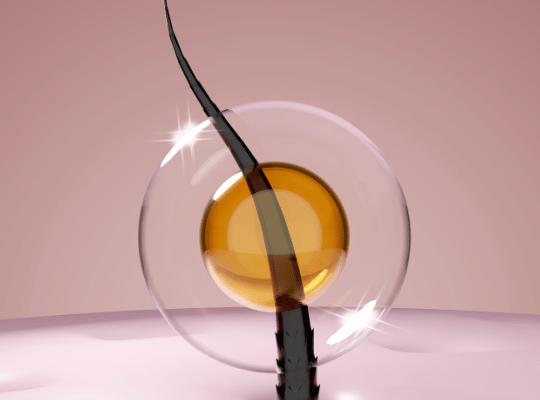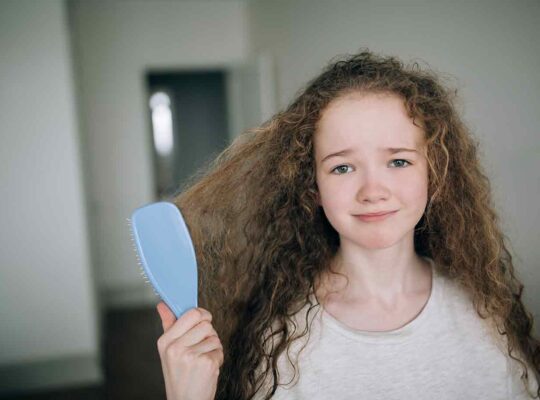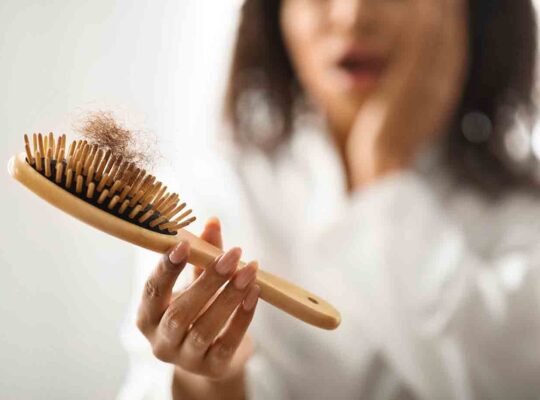Did you know that hair loss can be a symptom of menopause? Menopause is a natural part of life that usually happens to women between the ages of 45 and 55. It marks the end of menstrual cycles and brings many changes to the body. Most people know about hot flashes and mood swings, but did you know that hair loss is also a common symptom during menopause? Although it’s not often talked about, hair loss can be a big concern for many women. Let’s take a closer look at why this happens, how to spot the signs, and what you can do to help manage it.
Understanding Menopausal Hair Loss
What is Diffuse Hair Loss?
When women lose hair during menopause, it’s often a type called diffuse hair loss. This means that the hair thins out evenly across the entire scalp, instead of just in certain spots. It’s different from male pattern baldness, where men might get bald spots or receding hairlines. For women, diffuse hair loss can make your hair look less full and thick overall.
How Common is Hair Loss During Menopause?
Hair loss during menopause happens more often than you might think. While it varies from person to person, many women notice their hair getting thinner during this time. Hair loss isn’t just about looks—it can also affect how you feel about yourself, which is why it’s important to understand and address it.
Causes of Menopausal Hair Loss
Hormonal Changes: The Main Culprit
The biggest reason for hair loss during menopause is hormonal changes. As women get closer to menopause, their bodies produce less estrogen and progesterone. These hormones are important for keeping hair healthy and growing. At the same time, the levels of androgens (male hormones) can go up. This shift in hormones can lead to:
- Thinner Hair: With less estrogen, your hair might grow slower and become more fragile.
- More Hair Falling Out: Higher androgen levels can cause hair follicles to shrink, leading to more hair shedding.
Telogen Effluvium: What Is It?
Telogen effluvium is another condition that can happen during menopause. This condition causes more hair to fall out than usual because the hair’s growth cycle is thrown off balance. Normally, hair goes through a cycle of growth, rest, and shedding. During menopause, more hairs can enter the shedding phase at once, causing noticeable hair loss.
Other Contributing Factors
Besides hormones, other things can make hair loss worse during menopause:
- Stress: Going through menopause can be stressful, and stress is known to make hair loss worse.
- Nutrition: Not getting enough of the right vitamins and minerals can weaken your hair.
- Genetics: If your family members have experienced hair loss, you might be more likely to have it too.
Signs and Symptoms
Recognizing the signs of menopausal hair loss early can help you take steps to manage it. Here’s what to look out for:
Thinning Hair
You might notice that your hair is getting thinner. For example, your ponytail might feel smaller, or you might see more of your scalp when you part your hair.
Increased Shedding
If you find more hair than usual on your pillow, in the shower, or on your brush, you might be experiencing increased shedding. While it’s normal to lose some hair every day, a sudden increase could be a sign of menopause-related hair loss.
Changes in Hair Texture and Growth Patterns
During menopause, your hair might also change in texture. It could become drier, more brittle, or even frizzier. You might also notice that your hair grows more slowly or unevenly.
Diagnosis and Assessment
Why is Medical Evaluation Important?
If you’re losing hair during menopause, it’s a good idea to see a doctor. Hair loss can have many causes, and a healthcare provider can help figure out if menopause is the reason, or if something else is going on.
Trichoscopy and Other Diagnostic Tools
Doctors can use a special tool called a trichoscope to take a close look at your scalp and hair follicles. This tool helps them see any changes that might be causing hair loss. Your doctor might also do blood tests to check your hormone levels and rule out other possible causes like thyroid problems or nutritional deficiencies.
Treatment Options
Topical Treatments
One of the most common treatments for hair loss is minoxidil. You can buy this treatment over the counter, and it’s applied directly to the scalp. It helps some women grow thicker hair. While it’s not a cure, many people see improvement after using it for a few months.
Hormonal Therapies
Estrogen therapy can help with many menopause symptoms, including hair loss. By adding back some of the estrogen your body is losing, hormone therapy can sometimes help slow down or even reverse hair thinning. But it’s important to talk to your doctor about the risks and benefits, as hormone therapy isn’t right for everyone.
- Phytoestrogens: For a more natural option, phytoestrogens—plant-based compounds that act like estrogen—might help. These are found in supplements and foods like soy and flaxseed.
Nutritional Approaches
Eating well is important for keeping your hair healthy. You might want to add these to your diet:
- Vitamins and Minerals: Supplements like biotin, zinc, and iron can help your hair grow stronger.
- Diet Modifications: A balanced diet full of fruits, vegetables, lean proteins, and healthy fats gives your hair the nutrients it needs.
Lifestyle Changes
Stress Management Techniques
Since stress can make hair loss worse, learning to manage stress is really important. Here are some ways to reduce stress:
- Try Relaxation Techniques: Activities like meditation, yoga, or deep breathing can help you relax.
- Exercise Regularly: Staying active is a great way to reduce stress and keep your body healthy.
Hair Care Practices to Minimize Damage
How you treat your hair every day can make a big difference. Here are some tips to keep your hair healthy:
- Be Gentle: Avoid harsh brushing and tight hairstyles that pull on your hair.
- Use Mild Products: Choose gentle shampoos and conditioners without harsh chemicals.
- Limit Heat Styling: Try to use heat tools like straighteners and curling irons less often, as they can damage your hair.
Coping Strategies
Psychological Impact of Hair Loss
Losing your hair can be tough, especially when you’re already dealing with other changes during menopause. It’s normal to feel upset or worried about it. But remember, you’re not alone, and there are ways to cope with these feelings.
Support Groups and Resources
Talking to others who are going through the same thing can help a lot. You might want to join a support group, either in person or online, where you can share your experiences and get advice. There are also many resources available, including counseling services that can help you manage the emotional side of hair loss.
Prevention and Long-term Management
Early Intervention Strategies
The sooner you start addressing hair loss, the better. If you notice your hair is thinning or shedding more than usual, don’t wait to seek help. Early treatment can slow down hair loss and might even help your hair grow back.
Ongoing Care and Monitoring
Once you start treatment, it’s important to keep up with it. Regular check-ups with your doctor can help you track your progress and make any needed changes to your treatment plan.
Conclusion
Hair loss during menopause can be upsetting, but understanding why it happens and knowing your options can make it easier to manage. Whether through treatments like minoxidil, lifestyle changes, or hormonal therapy, there are ways to keep your hair healthy. If you’re noticing symptoms, don’t hesitate to talk to your doctor. With the right care and support, you can take control of your hair health during menopause and beyond.
Common Symptoms of Menopause and Their Prevalence
| Symptom | Prevalence |
|---|---|
| Vasomotor symptoms (hot flashes, night sweats) | 75% |
| Genitourinary syndrome | Common |
| Mood changes | Common |
| Joint and muscle pain | Common |
| Hair thinning/loss | Varies |
| Cognitive changes | Associated with aging |
This table shows some of the common symptoms women experience during menopause, including hair loss. Understanding these can help you see how hair loss fits into the bigger picture of menopausal changes.
FAQs
- Is hair loss a common symptom of menopause?
- Yes, many women experience some degree of hair thinning or shedding during menopause due to hormonal changes.
- Can stress during menopause cause hair loss?
- While stress alone doesn’t cause hair loss, it can act as a trigger, especially during menopause when your body is already undergoing hormonal changes.
- What treatments are available for hair loss during menopause?
- Treatments include topical solutions like minoxidil, hormonal therapies, nutritional supplements, and lifestyle changes.
- Will my hair grow back after menopause?
- Hair regrowth is possible, especially with early treatment, but it can vary from person to person.
- How can I prevent hair loss during menopause?
- Maintaining a healthy lifestyle, managing stress, and seeking early treatment can help prevent or reduce hair loss during menopause.


